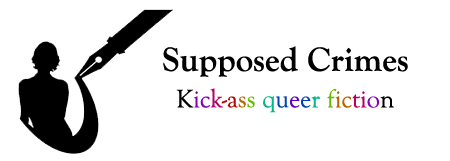
One question that comes up frequently associated with indie authors and small presses: "Should I message an author to let them know about typos in their published work?"
The answer is complicated. Some authors welcome this kind of feedback; others don't. Regardless, there are some things a person could consider before poking into someones DMs.
1. Is it actually wrong?
2. Is it a single instance, or is the manuscript littered with them?
One misspelled word in an entire manuscript isn't a big deal. Literally every book ever has at least one, trust me. Yep, even ones from the Big Five publishers. Make like Elsa and let it go. Your life will be happier.
If it's so bad it's unreadable, it might be a situation where the author or publisher couldn't properly pay someone to edit. Instead of making a list of what you think are the flaws, make a recommendation for an editor, offer to read through it yourself, or help them pay for good editing. A random DM might not be the best way to go here.
3. Would you or have you DM'd [Big Name Author] about this stuff?
Chances are, you're not emailing Stephen King or J.K. Rowling personally about their typos. Therefore, you shouldn't be doing it to indie and small press authors either, especially if you're unconnected in other ways.
4. Have you interacted with this author in any other way?
I'm not averse to having my beta readers or my close friends point something out. But we also have a relationship already. With my beta readers, we've discussed the story in question at a deeper level than typos. These are trusted souls. Strangers on the internet? Not so much.
5. Has the author specifically invited this type of correction?
If an author has not made a statement of approval, think twice before messaging with unsolicited advice. If an author has made an explicit statement asking that you not do this, and you do it anyway, you've violated their consent. It's rude, and you really shouldn't, no matter how correct you are.
6. Does the author have a publisher?
You can find this info on any website where the book is listed. Publishers are a buffer for authors. While I know authors need a thick skin, that doesn't include a requirement to reply to strangers "helping" them with their edits. If you think a typo is so serious it ruins the book, then tell their publisher.
If this is a self-published author, try looking at reviews and in other places to see if someone has already mentioned it. If you can't find any mention of this allegedly book-ruining typo anywhere, entertain the idea it's just your opinion and you don't need to do anything about it.
7. Have you or would you do this with any other art form?
I've certainly met people who are the type to stand in a museum and point out what they think would "fix" a painting or sculpture. They're really annoying. It's just as annoying to try discussing the major points of a book with someone who insists it would've been a better story if not for the typo on page 23. Pedantic people are not fun. But even if that's not how you usually are, you might be coming across that way to an author if you randomly inbox them with your suggestions for "improvement."
8. Is this going to improve the author's overall writing?
If the manuscript is a mess, then yes, it might. But on the whole, a lack of typos isn't what makes a writer great. We are always learning and growing in our craft. But if all we ever hear about is the typos that got missed in the editing phase, we're going to end up stressed about the wrong things. It's far better to engage an author on what worked in the story, what didn't, and how the overall message was delivered.
9. Why do you really want to do this?
Maybe your motives are genuinely altruistic. You're a professional editor or you care deeply about books or you're an indie author yourself and wish someone would've cared for you in this way.
Or maybe not. Ask yourself what both you and the other person might get from this situation. If your aim is to vent because that typo annoyed you, find a better outlet than the author. And if you're truly wanting to help an author, think about some other, less picky ways you might do that.
Ultimately, you have to make the call yourself whether you should DM an author. It's wise to think carefully about it rather than impulsively racing to your keyboard to pound out a message. If you decide it's worth it, don't be surprised if you don't get a response. Authors don't owe you our time or energy when you message us with things we may or may not have control over. For that matter, a publisher often has bigger fish to fry than a petty concern over a book with "an" instead of "and." Just take a step away and think about why and how you want to address the issue.
